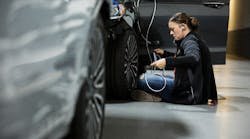The death of a pedestrian struck by a self-driving Volvo XC90 sport utility vehicle (SUV) in Arizona last month – an SUV that’s part of a fleet of self-driving cars deployed by Uber in the Copper state – is creating something a “second stage backlash” against autonomous vehicles (AV) technology. I call it “second stage” because the “first stage” occurred almost two years ago when a Tesla Model S in “self-pilot” mode rammed a tractor-trailer, killing the Tesla’s driver.
The National Transportation Safety Board (NTSB) determined that a truck driver’s failure to yield the right of way and the Tesla’s driver’s inattention due to “overreliance on vehicle automation” were the probable cause of that crash back in May 2016, near Williston, FL.
The NTSB also determined the operational design of the Tesla’s vehicle automation permitted “over-reliance” on the automation technology allowing for “prolonged disengagement” from the task of driving a vehicle and also enabled the Tesla’s owner to use the technology in ways “inconsistent” with manufacturer guidance and warnings.
“System safeguards, that should have prevented the Tesla’s driver from using the car’s automation system on certain roadways, were lacking and the combined effects of human error and the lack of sufficient system safeguards resulted in a fatal collision that should not have happened,” noted NTSB Chairman Robert Sumwalt III in August last year.
Coming back to the present, suspensions of driverless vehicle testing are now starting to pick up speed: first for Uber in Arizona, followed by Toyota and just yesterday for the company that made Uber’s self-driving technology, Nvidia.
But all of this in many ways obscures a deeper issue with driverless technology: many motorists don’t trust it (and this pre-dates the Uber crash, mind you) which is a feeling shared by truckers, too.
Indeed a new survey conducted by Ipsos that polled 21,000 adults across 28 countries about the acceptance of AVs, which autonomous features are most in demand, potential ownership models and regulation options, found that nearly one in four Americans “would never use” a self-driving car vehicle. This is just one key finding from a report about the future of mobility released by Ipsos, a leading global market research firm. Ipsos surveyed more than 21,000 adults across 28 countries about acceptance of AVs, which autonomous features are most in demand, potential ownership models and regulation options.
Conducted as part of its “What the Future” survey series, Ipsos found this “reluctance” by Americans to “embrace this emerging technology” might have to do with their strong “identity” with “car-culture,” for nearly six in 10 considered themselves “car people,” and 81% feel that the car they drive reflects their personality, a least to some degree. Digging deeper into the data, Ipsos found hints of a coming car-culture clash as noticeable divides about acceptance of autonomous vehicles are seen along political lines.
Across a number of topics addressed in the “What the Future” report, the data show that Democrats are more supportive of autonomous vehicles, more interested in their features and benefits and more assured that these vehicles are coming in the near future. According to Ipsos’ polling, 59% of Democrats are in favor of self-driving cars versus 46% of Republicans while independents are split down the middle 50/50.
Clifford Young, president-U.S. for Ipsos Public Affairs, noted that this survey is part of an effort to divine what “big questions” companies should be asking themselves about the future of their industries. Yet despite American technology and automotive companies leading the way in AV development, it turns out Americans (and Canadians, too) are among the most reluctant to use it compared to those in, say, China, who are twice as likely to say they “can’t wait” to use AVs.
“The safety improvements, potential cost-saving, and increased convenience might well prove a trifecta of benefits that can trump any sort of political discord,” Young said in a statement. “But social change on this scale does not happen without conflict, and those who do not plan for it will be the first to see their plans derailed by our age of uncertainty.”
Here are a few other results from Ipsos’ report to think on when it comes to AVs:
- More would prefer to continue owning their own vehicle (42%) than other proposed usage models including hiring one on a per-use basis (22%) or leasing one for a monthly subscription fee (14%)
- Many Americans are unsure where regulation should come from, but would prefer manufacturers and tech companies (36%) to self-regulate over government regulation (24%)
- Cost will be a factor: 24% said they would switch to a self-driving car if it cost the same as their current car, but 45% would switch if it cost much less
- Many Americans (30%) would take more road trips in self-driving cars, including longer trips and new destinations
- Globally, a majority of those surveyed say that AVs will be easier, more comfortable safer, more relaxing, more economical, more enjoyable, and friendlier to the environment. Yet few think AVs will be faster
- Americans are more skeptical of touted benefits including improved safety, comfort and ease-of-use
- Autonomous parking is the feature respondents are most ready to use, with 58% saying they would utilize autonomous functionality “always or frequently.” Many (47%) would use it for commuting and in stop-and-go traffic, and 52% would use it for long-distance drives
- Younger Americans (under 35) have more favorable views of self-driving cars and their benefits



